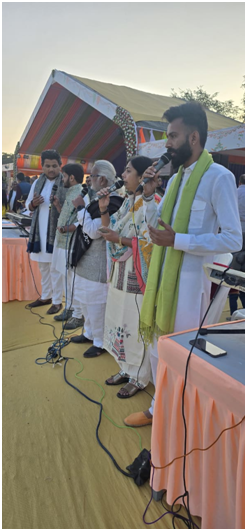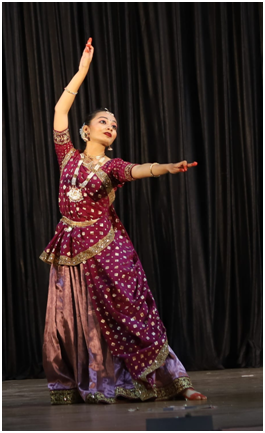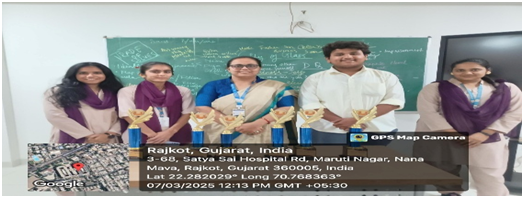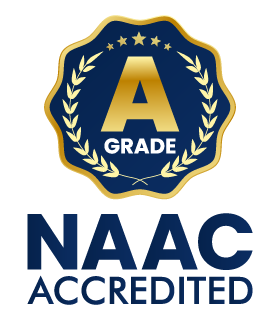About Department
Vision & Mission
Objectives
- An improved intellectual flexibility along with an added understanding of human values.
- Remarkable interpreting skills with the understanding of the various literary forms, theories, methods and culture.
- Proficiency in the use of English language while making their base of literature stronger.
- Polished analytical skill that will make provisions for the students for their research and professional environment.
Graduate Attributes
- Academic excellence: Ability to identify key questions, research and pursue rigorous evidence-based arguments
- Critical Thinking and Effective communications: Analysis and evaluation of information to form a judgement about a subject or idea and ability to effectively communicate the same in a structured form.
- Global Citizenship: Mutual understanding with others from diverse cultures, perspectives and backgrounds
- Life Long Learning: Open, curious, willing to investigate, and consider new knowledge and ways of thinking
Program Educational Outcomes
|
Our programme will produce Graduates who will attain following PEOs after few years of graduation |
|
| PEO1 : | Core competency: will develop the competency to pursue higher education or successful professional career with synergistic combination of the knowledge and skills of English |
| PEO2 : | Breadth of knowledge: will show capabilities of independently designing, executing and interpreting small research problems by integrating the interdisciplinary knowledge of English and other domains. |
| PEO3 : | Preparedness: will have the potential to show willingness to take any task or assignment in the capacity of a leader or team member in their chosen occupations or careers and communities. |
| PEO4 : | Professionalism: will show values and responsibilities in the character to make them fit to work in a multidisciplinary team and to become socio-ethically responsible citizen. |
| PEO5 : | Learning environment: will develop mind-set of self-learning abilities and keep themselves abreast with new development in all spheres of life. |
Program Outcomes
|
After completion of the programme the Graduate will be able to: |
|
| PO1 : | Domain knowledge: Demonstrate and apply the knowledge of translation, forms and critical theories professionally. |
| PO2 : | Problem analysis: Acquire critical thinking skills to understand and solve contemporary problems with interdisciplinary knowledge of English and other domains. |
| PO3 : | Multicultural Competence: receive the understanding of language, literature and culture from across the globe. |
| PO4 : | Communication: Communicate effectively using different modes such as written and verbal to interact and understand the requirement of the society. |
| PO5 : | Modern tool usage: Learning the modern advancement and understand standard operating procedures and acquire in-depth technical competence to be prepared for the chosen career. |
| PO6 : | Values and society: Understand owns role in society and act in an honest and consistent manner based on a strong sense of self and personal values |
| PO7 : | Environment and sustainability: Understand complex environmental issues and their interrelationships and requirement of interdisciplinary domains for sustainable development |
| PO8 : | Ethics: Apply ethical principles and commit to professional ethics and responsibilities and norms of the Biotechnological practice. |
| PO9 : | Individual and team work: Able to function effectively as individual and as a member in multidisciplinary settings |
| PO10 : | Self-Directing Learning: Work independently in terms of reading texts and application of theories. |
| PO11 : | Digital Literacy: Utilize the digital sources for better explanations and understanding of a concept, theory and idea. |
| PO12 : | Life-long learning: Able to recognize the need to undertake life-long learning and acquire the capacity to do so |
Program Specific Outcomes
|
After completion of the programme the Graduate will: |
|
| PSO1 : | Be able to utilize English language while making their base of English literature stronger. |
| PSO2 : | Be able to absorb the knowledge of various literary forms, theories, methods and culture that will contribute in the development of their creativity. |
| PSO3 : | Be able to analyses the impacts of literature in the society and vice versa. |
| PSO4 : | Be able to think and write creatively and critically |
| PSO5 : | Be able to use and apply their knowledge of language and literature professionally |
Faculty profile
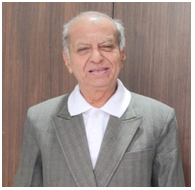
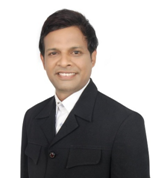
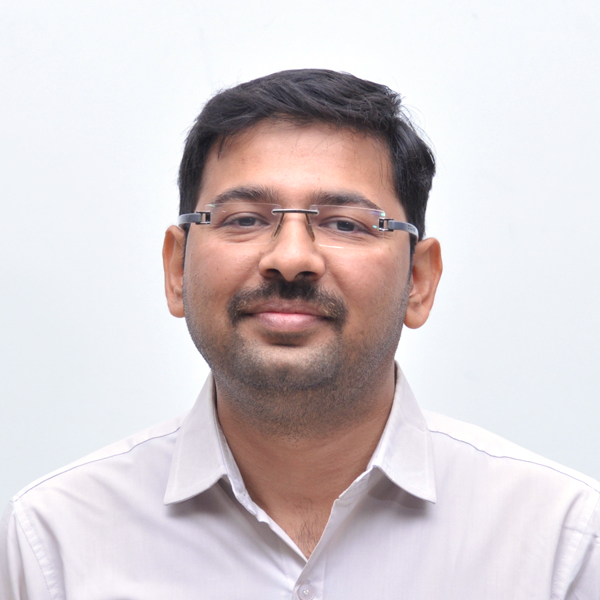
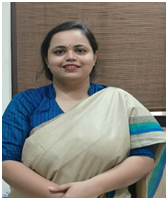
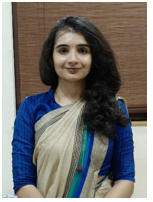
Ms. Aditi Kalpeshbhai Nanda
Assistant Professor
M.A. (Psychology), PhD (Pursuing)
Exp:01
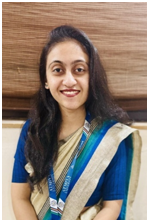
Ms.Arju Rakeshbhai Kanani
Assistant Professor
MA (Psychology), GATE, GSET,PhD (Pursuing)
Exp:01

Mr.Dhaval Balvantbhai Purohit
Assistant Professor
Ph.D, M.A. (English)
Exp:12
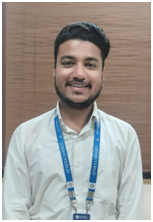
Mr. Aanay Aditya Bhatt
Assistant Professor
M.A. (English), GSET, PhD (Pursuing)
Exp:02
Mr.Gaurav Babubhai Makwana
Assistant Professor
Ph.D.,M.Phil., M.ph.
Exp:07
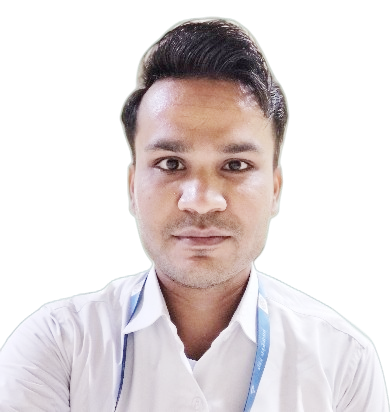
Mr.Gaurav Parmar
Assistant Professor
Ph.D.,M.Phil., M.A. (English)
Exp:04
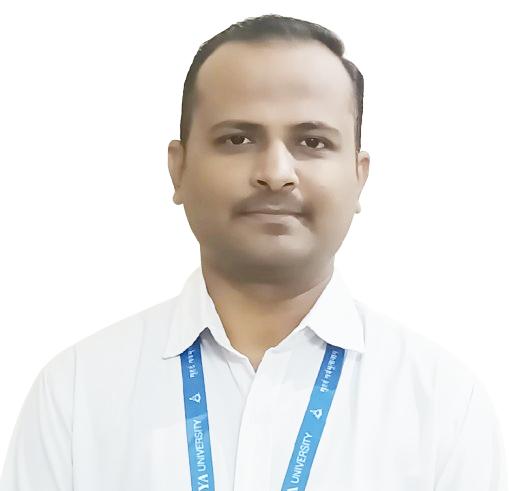
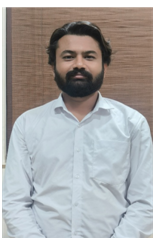
Dr.Jignesh Manharbhai Chavda
Assistant Professor
Ph.D., M.A. (English)
Exp:05
Ms.Kathangi Sanjay Dave
Assistant Professor
M.A. (Economics), GSET
Exp:01
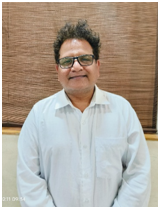
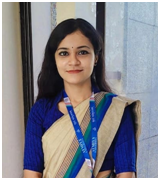
Ms.Moksha Kiritkumar Mehta
Assistant Professor
M.A.,(English), UGC NET, GSET, PhD (Pursuing)
Exp:02
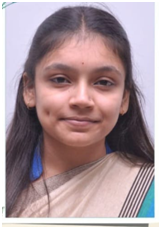
Ms.Nandita Ghediya
Assistant Professor
M.A. (English),GSET, PhD (Pursuing)
Exp:06
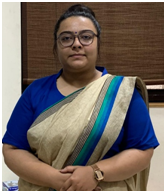
Ms. Nidhi Prakashbhai Chandarana
Assistant Professor
M.A. (English)
Exp:01
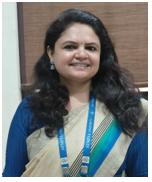
Dr.Rajeshwari Bhagvandas Kubavat
Assistant Professor
Ph.D, M.A. (English)
Exp:10
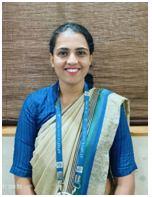
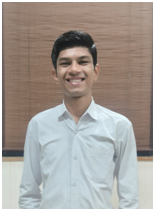
Mr. Saurabh Harshadbhai Chauhan
Assistant Professor
MA (English) UGC NET, GSET, GATE, PhD (Pursuing)
Exp:01
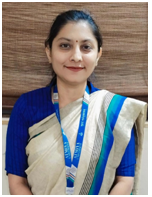
Dr. Nirali Ravaliya
Assistant Professor
MA (English), GSET, PhD,
Exp:01
Scope
The enthusiastic and curious faculty members of this department expect their students to develop the same qualities with an open mind. And these qualities allow students to explore and enjoy new theories, ideas and concepts around the world.
The students with these qualities open doors of ample opportunities for themselves. The papers that we offer here enhance their speaking and writing skills which help them to express themselves better. Having strong and clear background of literature and base of the language, the Postgraduates have various fields to go for after getting the degree. They can go for their master’s degree, teaching, journalism, hotel management, fashion designing, social work etc. After qualifying for exams like NET or SLET, the students can go for a government job that secures their future. They can also opt for some different jobs like a translator or editor as their learning here will make them competent with language. The field of art and drama is where these students can contribute remarkably as they have proper background and understanding of its theories and have studied some of the classic plays.
Along with this, the constant guidance of the teachers will help them shaping their career and future.
Research and Publication
| SR. NO. | FACULTY NAME | PUBLICATION | TITLE |
|---|---|---|---|
| 1 | Dr. Jitendra Aherkar | 11 |
1) A Study on Livelihood Strategies for Migrants in Pune District 2) Understanding Internal Mobility and Rural Migration 3) Rural Migration: Understanding and integrating Urban Policies 4) Self-Reliant India through rehabilitation of Beggars: A Review 5) An overview study of swachhbharat-swachhvidyala campaign 6) Impact of Vocational Education Amongst Women Entrepreneur in Maval Taluka of Pune District 7) Women Participation for Successful Financial Inclusion 8) Microfinance Banking: A boon for SHG’s 9) NABARD: A vital boon for SHG’s 10) Innovative Teaching and Management Practicies in Higher Education 11) An Overview of Financial Inclusion |
| 2 | Dr.Drashti Purohit | 05 |
1) “The Aspects of Indian Feminism and Problems in Translating: A Study of Kundanika Kapadia’s Seven Steps in the Sky” 2)“French Feminism: Genesis and Development” 3) “Comparative Literary Studies: A Retrospect” 4)“Existentialist Feminism in Simone De Beauvoir’s She Came to Stay: A Critical Study” 5) CRITICAL STUDY OF INFLUENCE OF WOMEN ON SATRE'S EXENTIALISM PHILOSOPHY: A CLASSIC EXAMPLE OF GENDER EQUALITY |
| 3 | Dr. Ashish Vora |
1) Recent trends of MSME’s advances by banks in India 2) Quality foot prints – sustainable development of higher education institutions 3) An Analytical study on urban sprawl due to urban population” 4) Financial Inclusion–Miles to go 5) An overview on Micro Finance in India 6) Innovative initiatives in corporate social responsibility 7) An Evolution of present supermarkets & home shopping culture in India 8) MSME’S in India: Issues and Challenges in the time of globalization 9) Measuring Economic impact of demonetization at Micro/ Macro level 10) Measuring Performance of SIDBI to Develop of MSMEs in India 11) Harnessing Generative AI for Business Growth and Opportunities |
|
| 4 | Dr.Srushti Dodia | 05 |
1) Myth of Akoopar and Time Binding- Surabhi 2) Moving Beyond the Two Dimensionality of Self by Yann Martel- Saurashtriya 3) Critique of J M Synge The Playboy of Western World- Ayudh 4) Theatre as the means of Distressing the Damsel- Literary Herald 5) Clementizing LGBTQ(ETC) Representations in Select Bollywood Movies –Memorabillia 6) From Life in a Metro to Ludo-Anurag Basu’s Hyper- Narrative Growth 7) Cinematic Language in Select Indian Hyper Narrative 8) Cinematic Portrayal of Women in Select Grief Narratives 9) Re-evaluating ‘Senses’ Through Apocalyptic Films: A General Semantics Approach |
| 5 | Ms. Moksha Mehta | 06 |
1) Myths, Legends and Jungian Archetypes: Unveiling the Symbolic Tapestry in Tennyson's Poetry 2) Role of Technology in Promoting the Cognition about Indian Knowledge System 3) Kitchen Chronicles: Exploring Cinematic Techniques and Domesticity in the Movies Mrs. and The Great Indian Kitchen 4) Beyond the Human: Posthuman and Postcolonial Inquiry into Vandana Shing’s Indian Cyber- Speculative Fiction AmbiguityMachine and Other Stories 5) Disembodied Minds and Digital Selves: Posthuman Narratives in William Gibson’s Burning Chrome 6) Prevalence of Primary Dysmenorrhea in Menstruating Females (Translation) |
| 6 | Ms. Nandita Ghediya | 01 |
1) The Triadic Trap and the Transcendent Self: A Study of Gunas and Liberation in the Shrimad Bhagvad Gita |
| 7 | Ms. Aditi Nanda | 02 |
1) Teaching Emotional Intelligence and Healthy Relationships: The Role of AI in Educational Challanges 2) Workplace well-being and employment challenges for zillennials: A sustainable Development approach |
| 8 | Dr. Rajeshwari Kubavat | 03 |
1) Studying Shashi Deshpande as a Feminist Writer: In the Light of Her Select Novels 2) A Brief History of Feminism in General and Feminism in India 3) Studying Krishna Sobti as a Feminist writer: In the light of Select Novels |
| 9 | Saurabh Chauhan |
1) Understanding the Two Hawks: A Comparative Analysis of Hughes’Hawk Roosting and Daruwala’s Hawk 2) Understanding Indiannes in Solarpunk through select short stories from "Multispecies cities: Solarpunk Urban Futures" 3) Breaking the Bricks: Examining the Fourth Wall Breaks in The Lego Movie |
|
| 10 | Aanay Bhatt | 01 |
1) Save Foot in Diabetes(Translation) |
| 11 | Dr. Jignesh Chavda | 040 |
1) Adaptation of Comics and Graphic Novels into Movies: Concerning Marvel and DC Cinematic Universes 2) Revival of Gond Art Form through Graphic Novel in Bhimyana: Experience of Untouchability 3) Legends of Halahala: Elements of Absurd, Bizarre and Uncanny Life Depicted in Graphic Novel 4) Reading of Two Indian Graphic Novels by Orijit Sen's River of Stories &Vishwajyoti Ghosh’s Delhi Calm as The Significant Contribution to Historical Trauma Literature |
| 12 | Dr. Shivangi Oza | 04 |
1) The quest for identity in Cry, the Peacock of Anita Desai and Maun Raag of KaajalOza Vaidya: A Comparative Analysis of protagonists 2) Depiction of Intricacy and Predicament in the lives of Maya in Cry the Peacock by Anita Desai and Anjali in Maunraag by KaajalOza Vaidya: A comparative analysis 3) Bim(Bimla)- The Eternal mother in Clear Light of the day 4) Complexities & Crisis in the lives of Mayain Cry, the Peacock by Anita Desai in Maunraag by KaajalOza Vaidya: a comparative analysis |
| 13 | Dr. Jay Ranpura | 04 |
1) Predicament of Sarita in ‘The Dark Holds No Terror’ by Shashi Deshpande 2) Jaya-The symbol of Silent Suffering in That Long Silence by Shashi Deshpande 3) A Comparative Analysis of Marital Disharmony in the selected novels of Shashi Deshpande and Varsha Adalja 4) A Character Delineation of Jaya in Shashi Deshpande’s That Long Silence |
| 14 | Mr. Nishant Dave | 02 |
1) Tendencies and Functions of Finnish Education System (ResearchPaper) 2) Dependability of ICT and English in Education (Research Article) |
| 15 | Mr. Nishith Mehta | 01 |
1) AI & EDUCATION - THE WAY FORWARD'( in ELT QUARTERLY- SEPT 2021) |
| 16 | Ms. Jayana Gajjar | 02 |
1) A Comparative Study of O. Henry and Pannalal Patel's Selected Love Story. 2) A Comparative Study of O Henry and Pannalal Patel's Selected Short stories |
Event
| Sr. No. | Event Name | Event Date | Photo Gallery |
|---|---|---|---|
| 1 | Ignite | 02-03-2025 | View |
| 2 | Decoding Hydro Fiction as New Genre of Literature | 20-09-2024 | View |
| 3 | Abhyuthan | 02-08-2024 | View |
Department Infrastructure
The FOHSS havespacious, well-lit and technically well-equipped classrooms. Additionally, it has advanced language labs supporting activities like pronunciation drills, LSRW exercise for improving competency of students. Along with it there is one discussion or art room to foster the creativity of students.
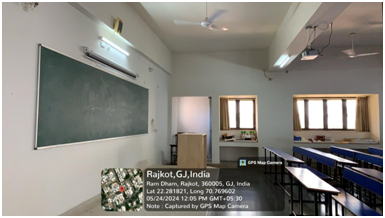
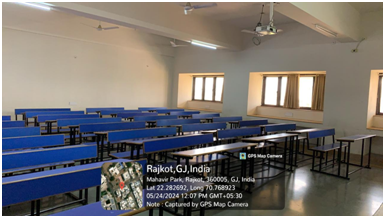
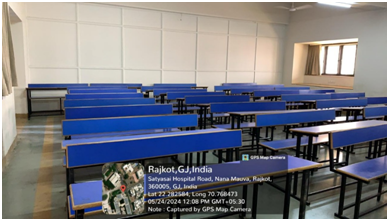
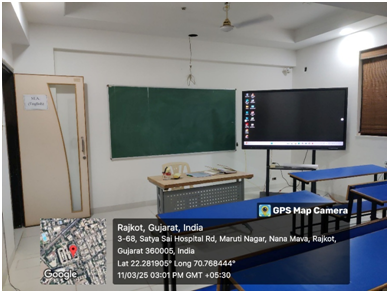
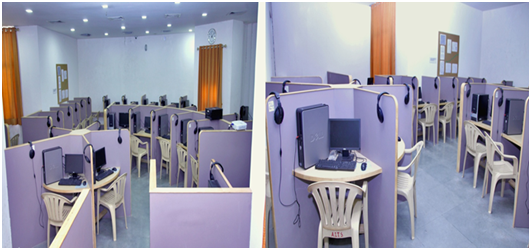
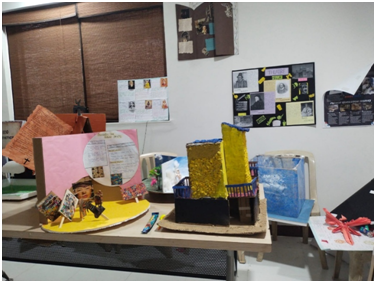
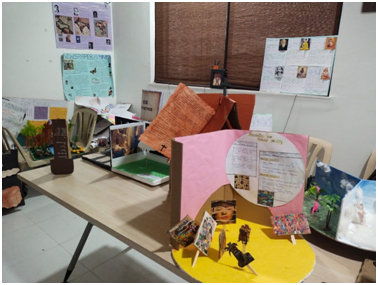
Placement
Achievements
- Esha Trivedi at ViViBha International Conference
- Paper presenters(FY) at AI National conference, Vallabhipur
- Achievers(SY-TY) of Avsar 2024
- Dhwani Trivedi (TY)performed on 26th January, Junagadh
- Priyanshi Mehta(TY) has completed Alankar
